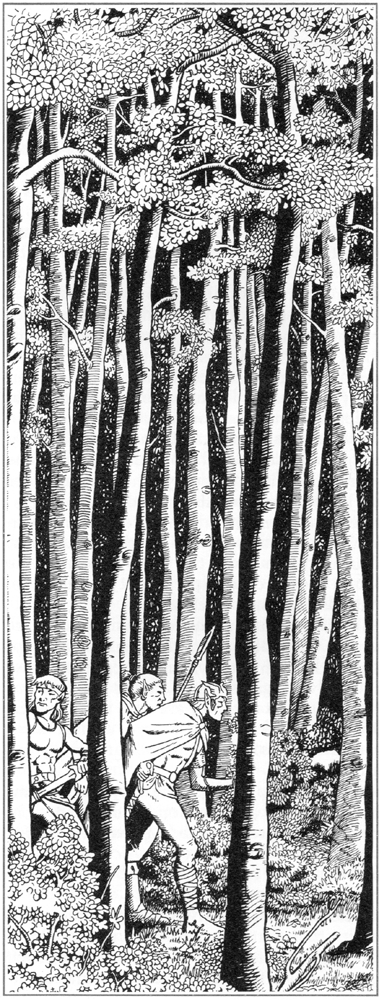Wood Elf
Wood elves, also known as copper elves, see themselves as guardians of the elven forests. Unlike most elves, they do not view themselves as a people apart from the rest of Abios.
Description
Wood elves are easily identifiable by their coppery skin and green, brown, or hazel eyes. Wood elf hair is usually black or brown, although hues such as blond or copper red are also common. Wood elves tend to dress in simple clothes, similar to those of the moon elves but with fewer bold colors and a greater number of earth tones that blend into their natural surroundings. Accustomed to a harsh, naturalistic lifestyle, wood elves love to wear leather armor, even when they are not under immediate threat. Wood elves are roughly identical to other elves in height and build, with males larger than females.
Wood elves are often stronger than other elves, but are frequently less cerebral than moon and sun elves, who put a greater value on education.
Personality
As a people, wood elves are largely seen as calm and level-headed. Arousing strong emotions in wood elves was not something that was easily done, although many do have a strong aversion for large cities, having lost the passion for urbanization. To wood elves, the trappings of civilization, including the mightiest of fortresses or tallest walls, are transient and impermanent things that will eventually be overcome by the long processes of nature. To many, this attitude seems condescending, weakening the bonds between wood elves and other races. Additionally, wood elves can sometimes seem off-putting compared to other elves, with a gruff manner that make them less charismatic, despite their avowed compassion and humility.
Culture
Although a proud people, wood elves feel that compassion is a greater virtue than strength and wood elf realms are less concerned with expansion than they are with maintaining amiable relations with their neighbors. Wood elves are not nomadic, however, as is common among the wild elves and instead they are organized into scattered, carefully concealed villages united under a gerontocratic hierarchy composed of village councils consisting of the most distinguished families' eldest members. These councils are often advised by local druids, whose influence play no small part in wood eld politics and who frequently serve as the webbing that binds any number of villages together as one realm.
Compared with other elves, wood elves have a notable disinterest in the arcane arts. To a wood elf, the wizard's spells are little different from the mason's castle walls or the tiller's plow—a means of controlling the natural world, which is contrary to the common ethic of living in harmony with nature rather than trying to dominate it that so many wood elves espoused. As such, wood elf adventurers are more likely to take on careers that do not require the use of arcane magic. In particular, many are drawn to the path of the fighter, the ranger, or the rogue, relying on their natural-born skill to overcome obstacles. Compared with other elves very few wood elves go on to become spellsingers or bladesingers. The one major exception to the wood elf taboo on arcane magic are the arcane archers, who count among their number several wood elves. Other wood elves from more remote areas are drawn to the ways of the barbarian while many religious wood elves become druids with clerics often seen in much the same light as wizards.
Magic and Religion
Wood elves are generally uncomfortable with most forms of magic, viewing wizards and other arcane spellcasters with no small amount of distrust. Clerics and other divine spellcasters fare little better in wood elf eyes, who see their prayers as a useless call to distant and alien gods. However, wood elves are largely at ease with the ways of the primal magic in use by druids, barbarians, shamans, and wardens, which they feel is the truest expression of supernatural power—or rather, a reflection of nature itself, used to protect the wilderness. However, wood elves are not completely adverse to arcane magic and wood elf bards, sorcerers, and wizards are far from unknown, although wood elves as a whole have no particular tradition of the Art.
Like other elves, the wood elves largely worship the Seldarine, but unlike their kin, they do not do so exclusively. The wood elves most commonly worship Solonor Thelandira, who has a particular connection to the untamed wilderness. Solonor, as the god of archery, is perhaps the most popular god among the wood elves, who will sometimes invoke him as their protector and patron deity just prior to a battle.
Relations with Other Races
Although a proud people themselves, wood elves often feel that their elven kindred, such as the sun elves, too often put on an air of superiority and xenophobia that is ultimately detrimental. Wood elves look to the examples of the ancient elven empires and, seeing failure after failure, feel that their aim should be compassion and humility, rather than political or military strength. Unlike many of their kin, wood elves feel that their fates are inextricably tied to those of Abios' other races and they make no effort to pull away or isolate themselves. Ironically, so reclusive are wood elf settlements that, despite their open nature, wood elves rarely actually see people from outside their race.
Of all the humanoid races of Abios, the ones most familiar with the wood elves are the humans and dwarves native to the North. Still, few humans or dwarves have ever actually met a wood elf and when they do it was often largely by chance. However, when meetings do occur, they are largely friendly and, like the moon elves, wood elves see themselves as allies and teachers of humanity, rather than as rivals. Wood elves also have a long tradition of friendship with the dwarves of Abios, dating back centuries, which carried on into the present.
Wood elves also feel a kinship with the sapient giant owls, with whom they form a symbiotic relationship. In return for the elves acting as protectors for the owls, the birds of prey often act as advance scouts for wood elf warriors.
Gnomes and halflings are less frequent guests among the wood elves, but they are generally seen favorably. Conversely, wood elves, like most elves, have a strong contempt for orcs, as well as for gnolls, though their reasons are less about the ancient enmity between Corellon and Gruumsh and more out of the devastation that raiding parties often bring to the forests that wood elves hold dear.
Homeland
Wood elves can be found in many scattered groups across the continent. Many can be found in the Elven Court of Inyhlone and Sile Allanar, with a few found in the Elven Court of Graygate. The wood elves call Alyha Elunore in the Kingdom of Tharethiel as their homeland, acting as protectors of the ancient elven forest of Syaenahona.
Encompassed species





Comments